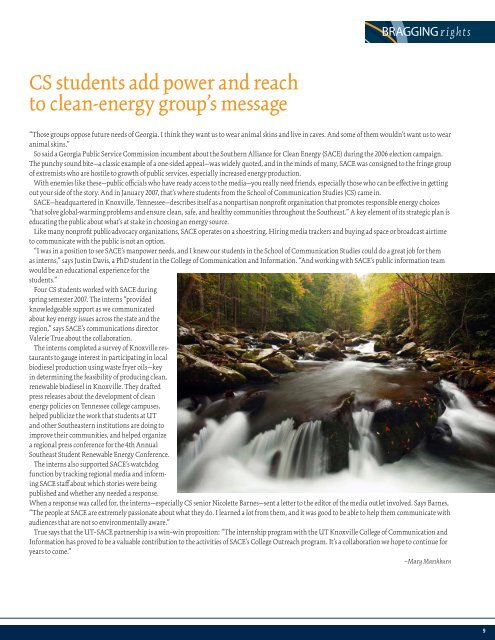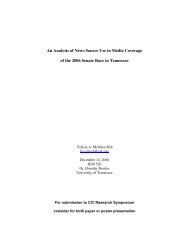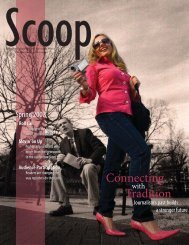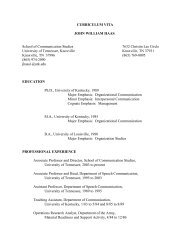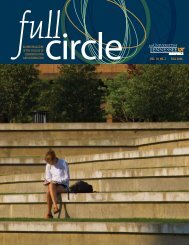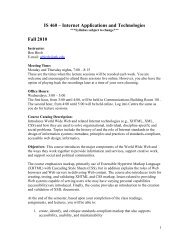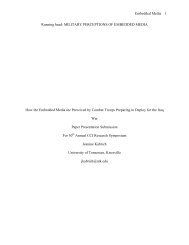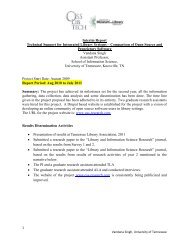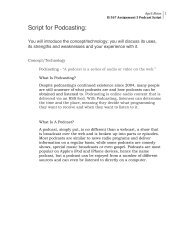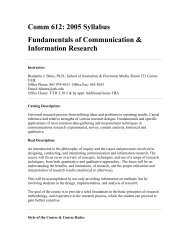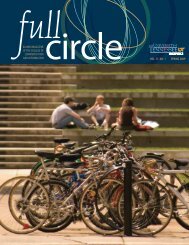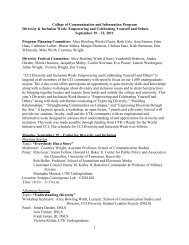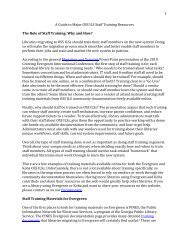Spring 2008 - College of Communication & Information - The ...
Spring 2008 - College of Communication & Information - The ...
Spring 2008 - College of Communication & Information - The ...
- No tags were found...
You also want an ePaper? Increase the reach of your titles
YUMPU automatically turns print PDFs into web optimized ePapers that Google loves.
agging r i g h t sCS students add power and reachto clean-energy group’s message“Those groups oppose future needs <strong>of</strong> Georgia. I think they want us to wear animal skins and live in caves. And some <strong>of</strong> them wouldn’t want us to wearanimal skins.”So said a Georgia Public Service Commission incumbent about the Southern Alliance for Clean Energy (SACE) during the 2006 election campaign.<strong>The</strong> punchy sound bite—a classic example <strong>of</strong> a one-sided appeal—was widely quoted, and in the minds <strong>of</strong> many, SACE was consigned to the fringe group<strong>of</strong> extremists who are hostile to growth <strong>of</strong> public services, especially increased energy production.With enemies like these—public <strong>of</strong>ficials who have ready access to the media—you really need friends, especially those who can be effective in gettingout your side <strong>of</strong> the story. And in January 2007, that’s where students from the School <strong>of</strong> <strong>Communication</strong> Studies (CS) came in.SACE—headquartered in Knoxville, Tennessee—describes itself as a nonpartisan nonpr<strong>of</strong>it organization that promotes responsible energy choices“that solve global-warming problems and ensure clean, safe, and healthy communities throughout the Southeast.” A key element <strong>of</strong> its strategic plan iseducating the public about what’s at stake in choosing an energy source.Like many nonpr<strong>of</strong>it public-advocacy organizations, SACE operates on a shoestring. Hiring media trackers and buying ad space or broadcast airtimeto communicate with the public is not an option.“I was in a position to see SACE’s manpower needs, and I knew our students in the School <strong>of</strong> <strong>Communication</strong> Studies could do a great job for themas interns,” says Justin Davis, a PhD student in the <strong>College</strong> <strong>of</strong> <strong>Communication</strong> and <strong>Information</strong>. “And working with SACE’s public information teamwould be an educational experience for thestudents.”Four CS students worked with SACE duringspring semester 2007. <strong>The</strong> interns “providedknowledgeable support as we communicatedabout key energy issues across the state and theregion,” says SACE’s communications directorValerie True about the collaboration.<strong>The</strong> interns completed a survey <strong>of</strong> Knoxville restaurantsto gauge interest in participating in localbiodiesel production using waste fryer oils—keyin determining the feasibility <strong>of</strong> producing clean,renewable biodiesel in Knoxville. <strong>The</strong>y draftedpress releases about the development <strong>of</strong> cleanenergy policies on Tennessee college campuses,helped publicize the work that students at UTand other Southeastern institutions are doing toimprove their communities, and helped organizea regional press conference for the 4th AnnualSoutheast Student Renewable Energy Conference.<strong>The</strong> interns also supported SACE’s watchdogfunction by tracking regional media and informingSACE staff about which stories were beingpublished and whether any needed a response.When a response was called for, the interns—especially CS senior Nicolette Barnes—sent a letter to the editor <strong>of</strong> the media outlet involved. Says Barnes,“<strong>The</strong> people at SACE are extremely passionate about what they do. I learned a lot from them, and it was good to be able to help them communicate withaudiences that are not so environmentally aware.”True says that the UT–SACE partnership is a win–win proposition: “<strong>The</strong> internship program with the UT Knoxville <strong>College</strong> <strong>of</strong> <strong>Communication</strong> and<strong>Information</strong> has proved to be a valuable contribution to the activities <strong>of</strong> SACE’s <strong>College</strong> Outreach program. It’s a collaboration we hope to continue foryears to come.”—Mary Marshburn9


